Dementia care
What is dementia care?
Dementia care is all about giving you the support you need to carry on living at home.
Dementia care is condition-led support designed to support you or your loved one as you face the specific challenges presented by your dementia. At Helping Hands, we provide dedicated dementia care to people in the comfortable, familiar surroundings of their own home. As a specialist dementia care provider, we train our carers to follow a routine that your loved one is used to and comfortable with, maintaining their independence as much as possible.

Dementia home care can support you with:
Condition-led care
Every case of dementia is unique. Our dementia specialist-supported carers always offer your loved one a care plan that is designed around their condition.
Responsive support
Our dementia care is responsive and can be adapted as your needs change, which is essential when supporting a complex medical condition
Fall prevention and management
We’ll work with you and your loved one to ensure your home is accessible and free of trip hazards, and that they’re confident moving around
A familiar environment
Staying at home for care means your loved one can manage and adapt to their symptoms in a familiar environment where they’re comfortable and secure
Experienced carers
Your loved one will get dedicated support from carers who are fully trained and equipped for caring for customers with dementia
Emotional support
A significant part of our holistic approach to dementia care is ensuring that both your loved one and the family are emotionally supported
What is dementia?
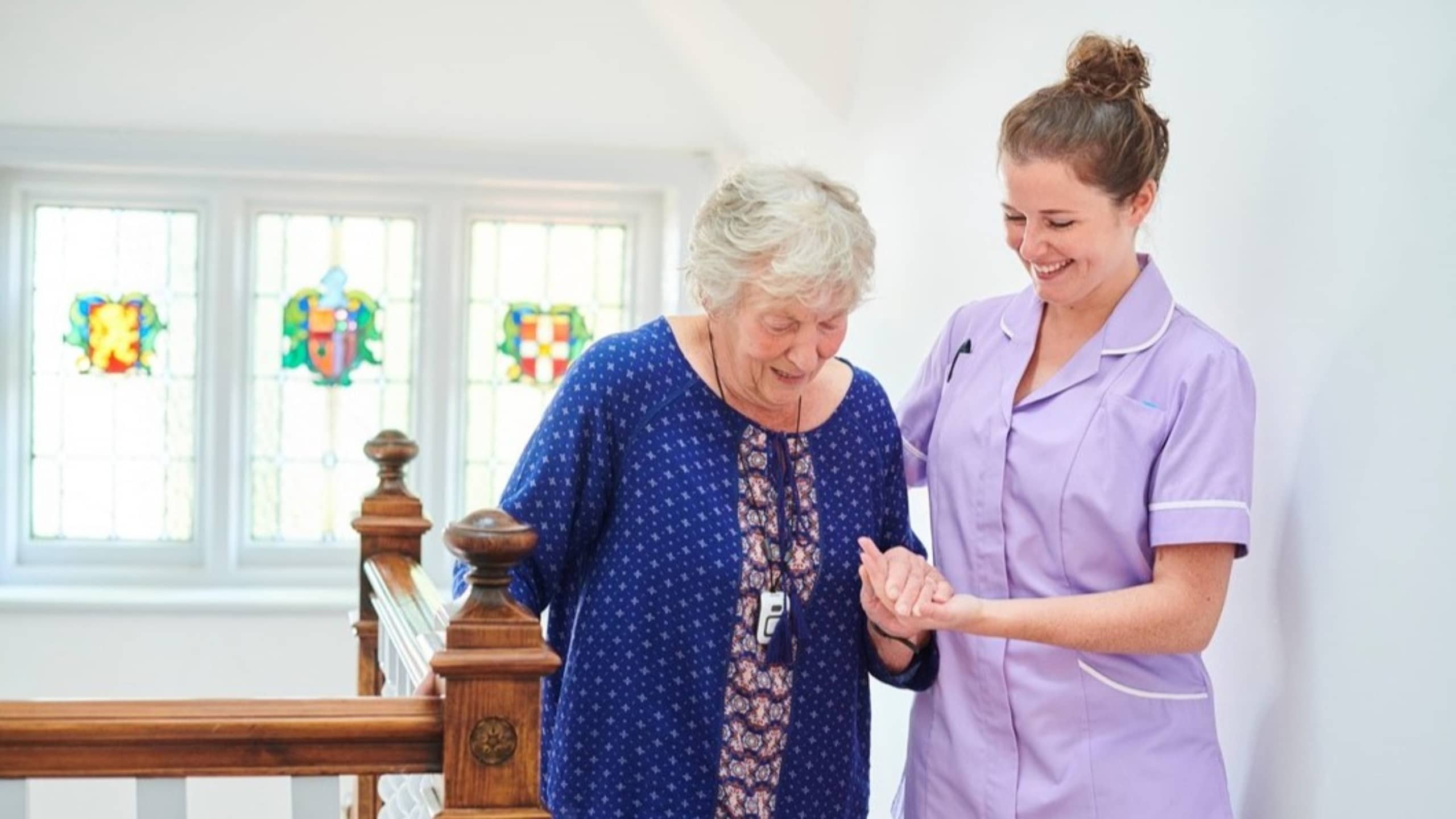
Dementia is an umbrella term for a range of progressive conditions that affect the brain.
There are numerous types of dementia; conditions grouped under the generalised term “dementia” are caused by abnormal changes to the brain, and normally affect the person’s memory. The brain is made up of billions of neurones (nerve cells) that communicate with each other through chemical signals. If a person has dementia, these neurones are damaged which means that these messages cannot be sent efficiently which in turn affects all functions of the body.
Alzheimer’s
Vascular dementia
Lewy body dementia
Frontotemporal dementia
Mixed dementia
Can a dementia patient be cared for at home?
Dementia care can be provided at home from either a visiting carer or a live-in carer.
When it comes to specialist dementia care at home, you need to know your loved one is going to be fully supported at all times. We offer flexible, person-centred dementia support on both a visiting care and live-in care basis. Here’s an idea of what each type of care involves:

Visiting care involves short, regular calls throughout the week to ensure your loved one is getting the support and specialist dementia care they require to help live with their condition.
Visits from 30 minutes
Flexible support
Condition-led care
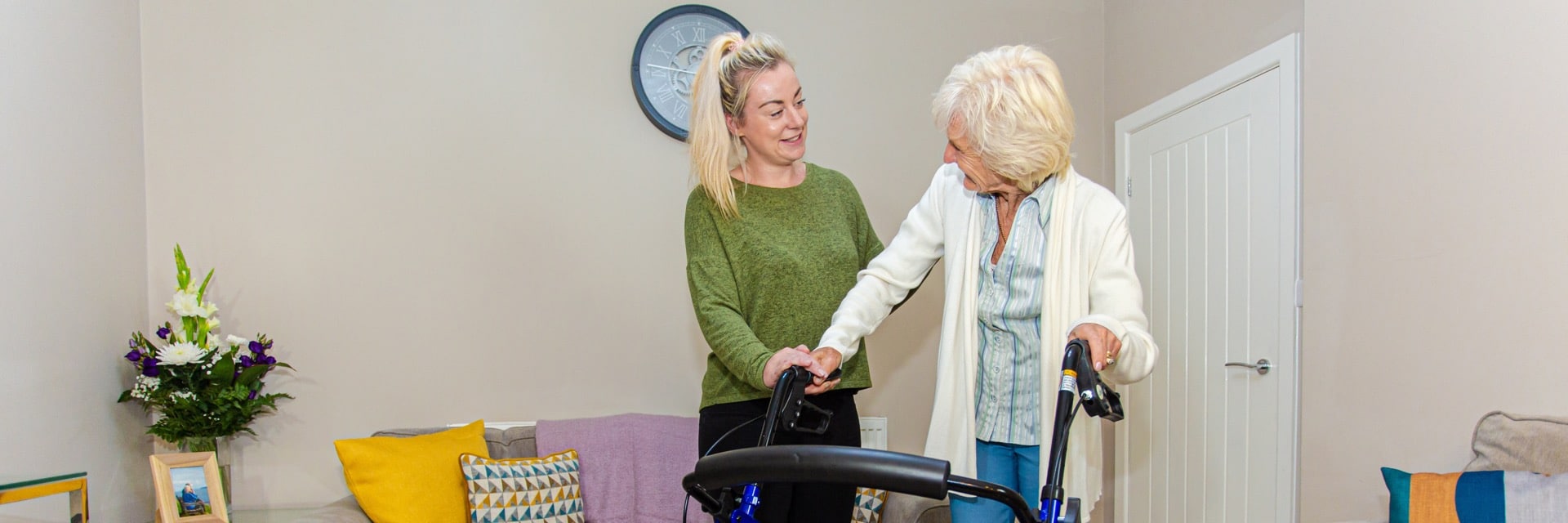
Live-in care places a specially trained live-in carer in your loved one’s home to provide personalised care every day. A live-in carer offers a constant source of care.
24-hour care
Life on their own terms
Handpicked carer


Hear from people with similar conditions
We love sharing stories from our customers about how our care is supporting them.
Find out how two of our customers, Janet and Molly, have been able to enjoy the life they deserve thanks to the support they receive from their Helping Hands carers.
Why trust Helping Hands for dementia home care?
You can trust our dementia experts to provide flexible, person-centred care for your loved one.
When choosing a dementia care provider, it’s only natural you want to ensure your loved one is getting the very best support. As a Dementia Champion accredited provider, our managers and private carers have all undertaken extensive training to ensure they have all the skills needed to provide outstanding dementia care.
We’ve also introduced a Dementia Champion accreditation for the many qualifying carers and managers who have completed the necessary training and assessment to a high standard.

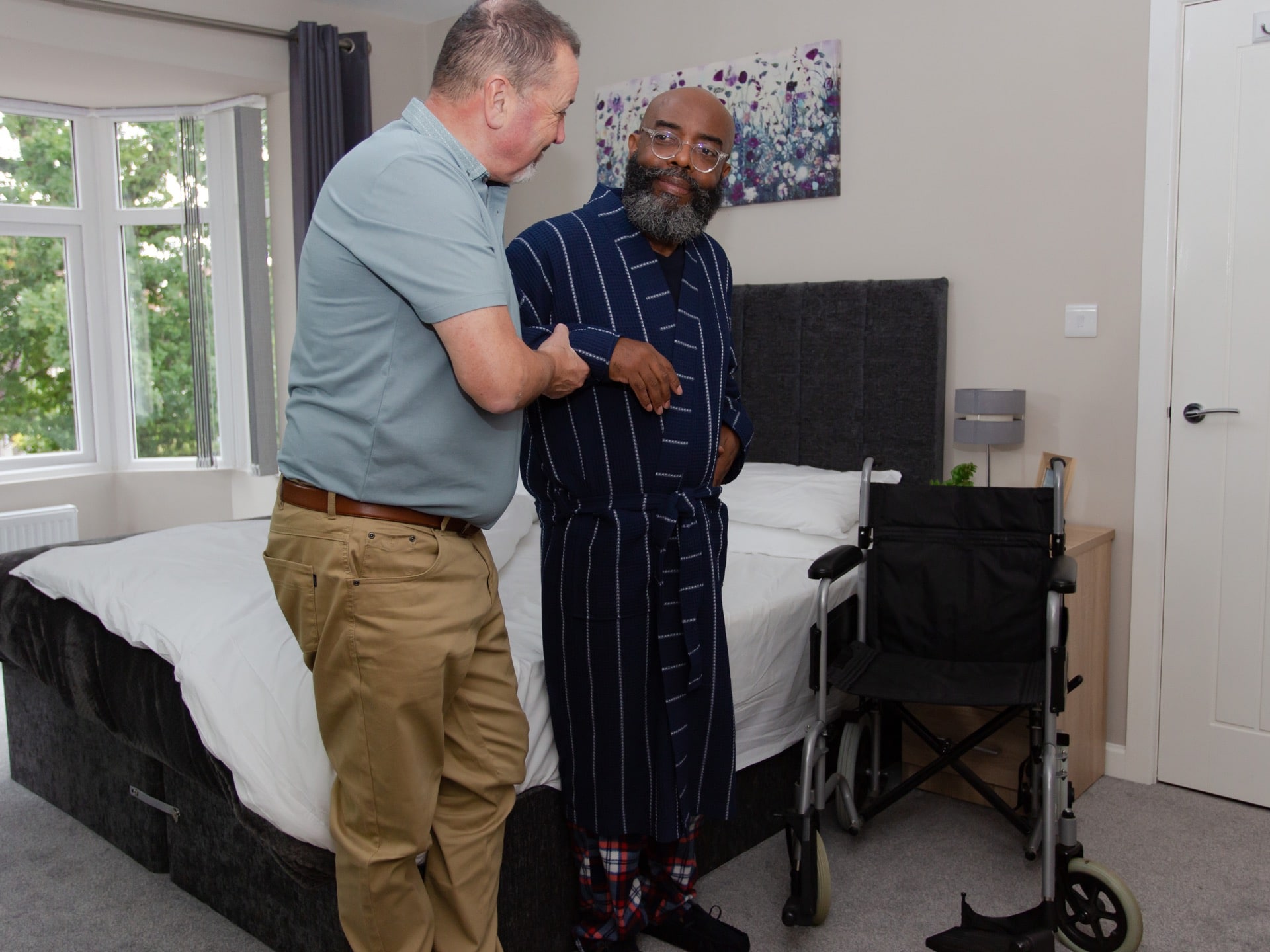
How can dementia care support your loved one?
Whatever your needs, our expertly-trained carers can support you in your home.
Whether you just need someone to check on your loved one first thing in the morning and help with personal care or breakfast, or continuous live-in care to ensure they’re safe in the night, you can be assured that our fully-trained carers will be on hand whenever you need them.
Continuous support from the dementia specialists
Personal care
As part of your care plan, your carer can provide discreet, dignified personal care – assisting with bathing, dressing and toileting
Preparing meals
Staying at home for care means you can ask your carer to prepare your favourite meals and snacks at the times that you’re used to
Assisting with housework
Our carers can help out with cleaning, vacuuming, tidying, doing the laundry, ironing, and just about everything else
Mobility support
All of our carers receive expert mobility training so that they can provide safe, secure mobility assistance around the home
Looking after pets
With help from your carer, there’s no need to worry about your furry friend continuing to get the food and exercise they need
Friendly companionship
All of our carers have been recruited for their approachable personalities and make for great companions as well as helpers
Encouraging good health for a better life
Our dementia care focuses on helping our customers to stay fit and healthy for longer, allowing them to enjoy a better quality of life.
If your loved one isn’t eating properly or has an unhealthy diet, they can be susceptible to illnesses which can increase the effects of dementia and cause further confusion and agitation. Encouraging a person with dementia to exercise may be difficult at times, but the benefits are worth it. The NHS recommend some easy exercises with your loved one if they have not been very active previously:
Chest stretch
Sit upright, pull your back from the chair and push your shoulders back. Extend your arms to the side and push your chest out until you feel a stretch.
Upper-body twist
Cross your arms on your chest and reach for your shoulders. Turn your upper body to the left without moving your hips. Repeat five times for each side.
Hip marching
Hold on to the sides of the chair and lift your left leg up as high up as is comfortable, keeping the knee bent. Do five of these lifts with each leg.
Ankle stretch
Straighten and lift your leg until it’s off the floor. Point your toes away and then back towards you. Try doing two sets of five stretches with each foot.
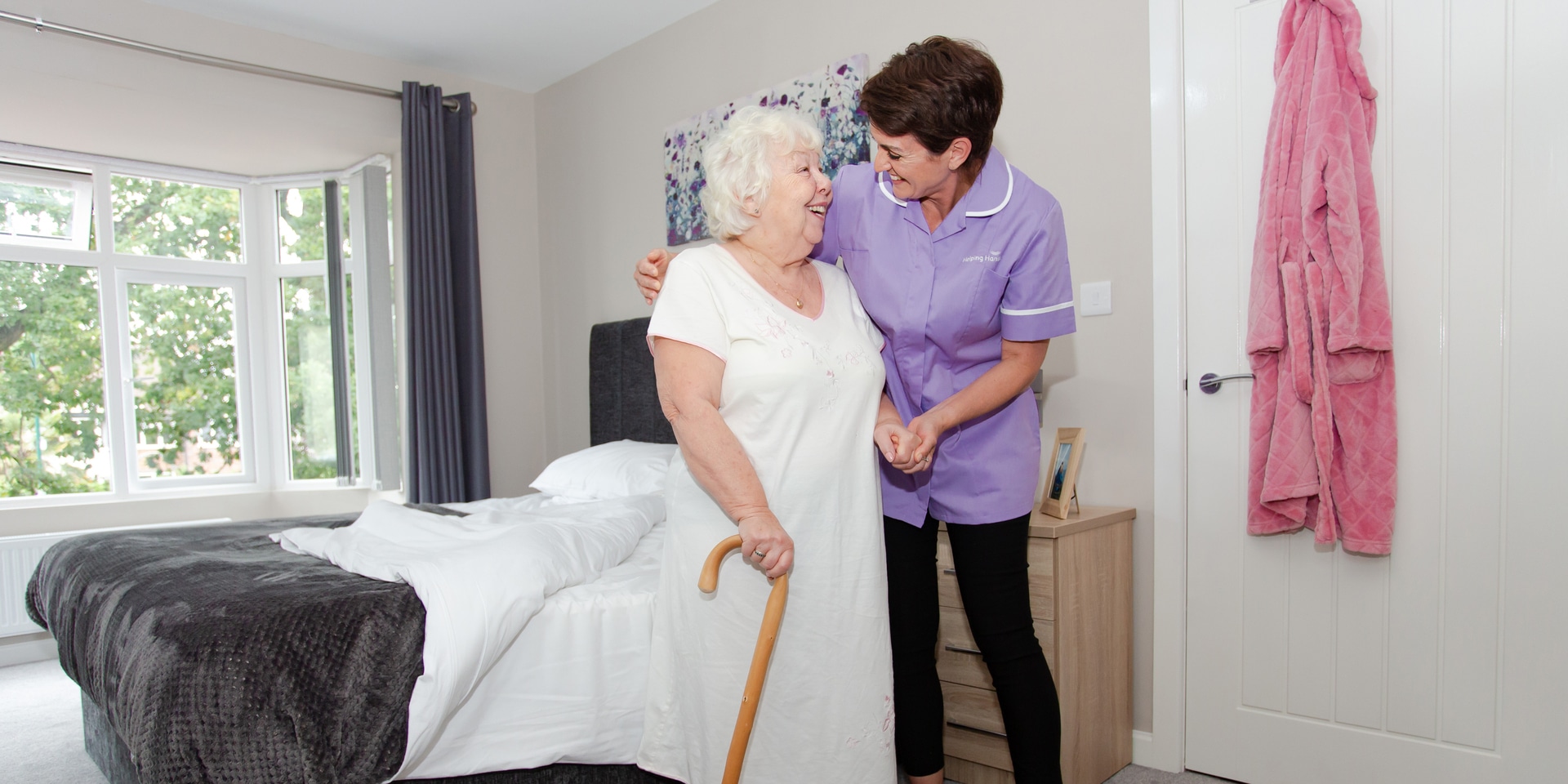
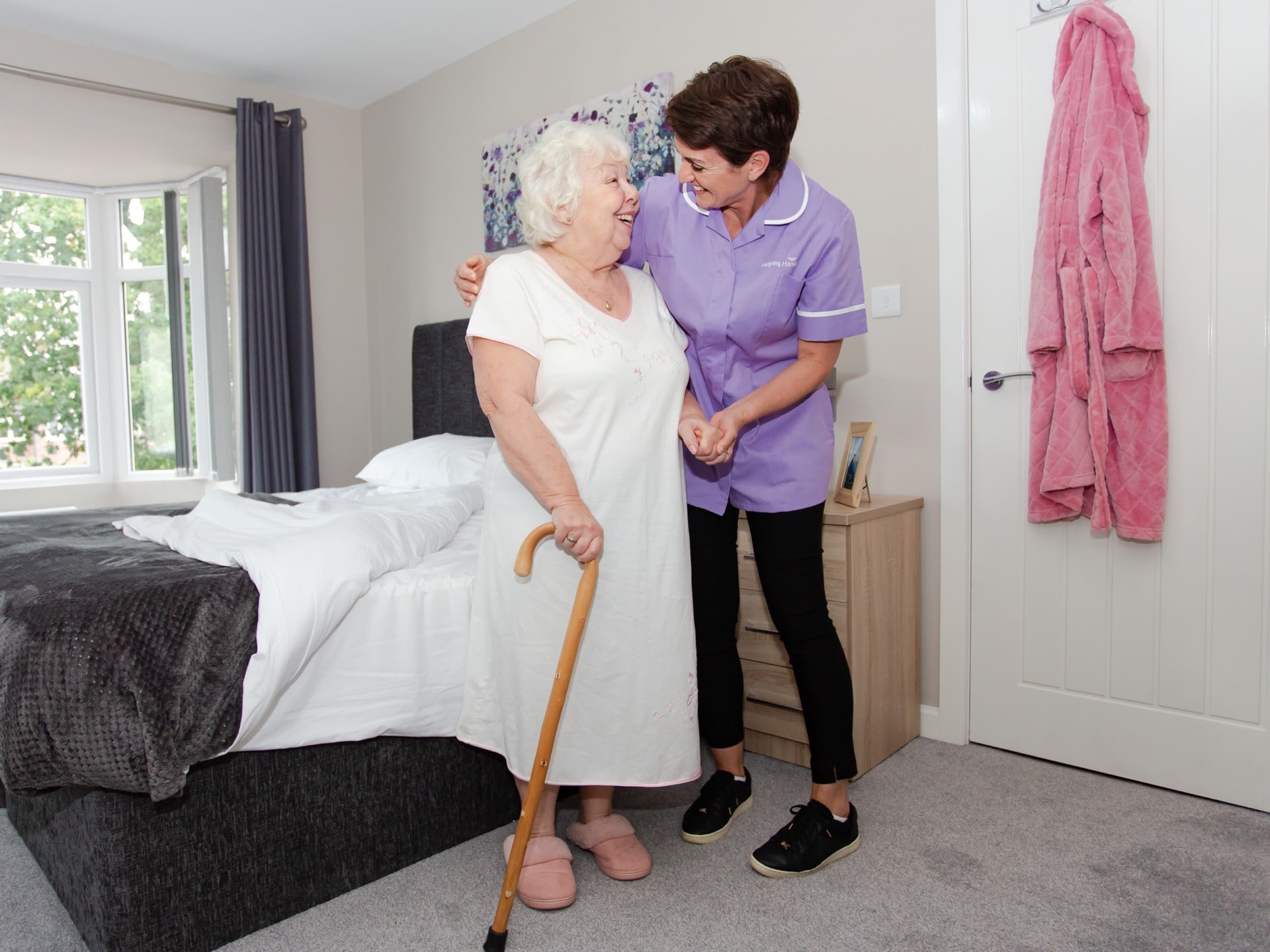
An alternative to residential care
Finding the right dementia care option for your loved one can take time, but one thing is for certain: if they want to remain at home, they can. Elderly care from Helping Hands serves as a viable alternative to residential care, and here’s why:
Care that facilitates hobbies and interests
A dementia diagnosis does not mean that someone automatically loses all interest in their hobbies. However, they may need some help with facilitating these.
Your loved one could enjoy reading a daily newspaper but find it difficult to go down to their local shop, or maybe they enjoy spending time in the garden but aren’t mobile enough to be able to get out of their home by themselves. A carer can help them to live a fulfilling life as independently as possible through maintaining their favourite hobbies and routines.

Over the years, we've helped our customers with:
Seeing family and friends
Our carers can help your loved one either visit friends and family, or host them – whether it’s just for a cup of tea or for an event such as a birthday
Gardening, cooking and crafts
Whether your loved one is green-fingered, artistic, musical or just likes being creative, our carers will always support them to maintain their hobbies
Attending church
A carer can help with supporting existing relationships and encouraging the person with dementia to join social groups, religious activities or hobbies
Trips and outings
With the support of an accompanying carer, we’ve helped countless customers to enjoy a day at the seaside or a visit to a local National Trust property
Popping to the shops
A carer can help your loved one do the weekly shop, as well as popping out to collect newspapers, magazines and other things for them to enjoy
...and so much more
We’ve helped our dementia customers to maintain countless hobbies and interests – from walking the dog to attending live sports fixtures
Additional pages we think you'll find useful
How is dementia diagnosed?
Read about how to get a dementia diagnosis for yourself or a loved one.
How dementia affects day to day living
How does dementia affect daily life?
What is dementia care?
Go into more depth on what is involved in a dementia care plan.
Types of dementia
Find out more about the different types of dementia and their effects.
How are Parkinson’s and dementia related?
How to define these two diseases.
What does dementia feel like?
What are some of the common symptoms that point to dementia?
How can you care for a loved one with dementia?
We’ve put together a dementia Life Story Book with Dementia UK to help you capture your loved one’s memories and reminisce with them – taking a trip down memory lane.
You may find that your loved one is having difficulty recalling past memories, family members or life events. To support them you can help communicate with them through their identity – like their background, hobbies, interests and who is important to them.
As their condition deteriorates and they progress through the stages of dementia, your loved one may need an increased amount of support. However, through still involving them in their everyday tasks, you will allow them to feel useful and may alleviate any negative feelings regarding their self-worth.
See our guide on dementia care and nutritional guide for more expert tips on supporting a loved one at home.
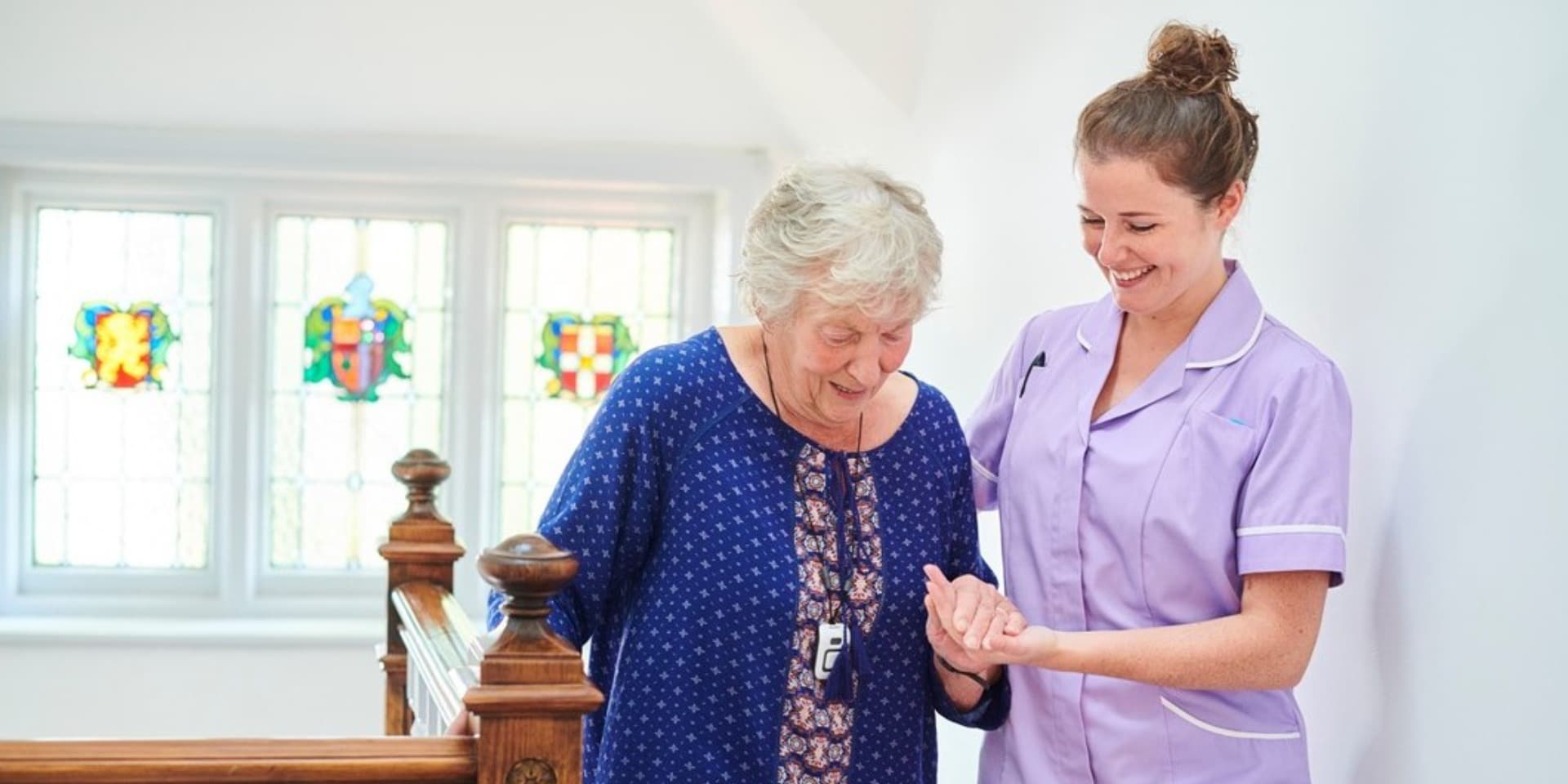

Fully regulated by the CQC / CIW
Here at Helping Hands, our dementia care service is fully managed and regulated by the Care Quality Commission (CQC).
From your very first phone call to our friendly team, every aspect of your home care service is independently monitored and regulated by the CQC and Care Inspectorate Wales (CIW).
Why is being a regulated company important?
What does regulation mean?
Our service is regularly monitored, inspected and regulated by the Care Quality Commission (CQC)
Why do we choose to be regulated?
We want every customer to have full peace of mind that their care is approved by a regulating body
How does regulation affect my care?
Our regulation means a guarantee that we’ll provide you with high quality care, no matter what
Dementia care at home within 24 hours
We try to make arranging care simple and stress-free so that we can focus on what really matters: your care needs. Speak to our team today to begin your journey within as little as 24 hours.
Speak to our team
Call our team of dementia experts to talk through your options and any questions you may have
Free home care assessment
Your local Helping Hands manager will visit you to discuss your loved one’s care requirements
Find your carer
We’ll help to match your loved one with a carer who meets their preferences and has the right skills
Dementia care FAQs
-
What does dementia care mean?
-
Dementia care is a package of care from expert carers for individuals with a diagnosis of dementia who are no longer able to live independently at home. This type of care is to help maintain the psychological and physical well-being of dementia patients.
-
What are The 7 Stages Of Dementia?
-
Commonly known as “The 7 Stages Of Alzheimer’s”, this framework is used to measure the effects of dementia on an individual. These are as follows:
1. No impairment – Dementia isn’t detectable and there are no memory problems
2. Very mild decline – The individual may experience very minor memory problems
3. Mild decline – Cognitive problems are noticeable
4. Moderate decline – Clear cut symptoms of dementia are apparent
5. Moderately severe decline – Additional assistance is required with most day-to-day tasks
6. Severe decline – The individual requires constant supervision and professional care
7. Very severe decline – The individual loses the ability to communicate or respond to their environment -
What do you do when a dementia patient refuses care?
-
Try to understand how they feel – this is likely to be a highly confusing and upsetting time for them. Ask questions to fully understand their circumstance and offer the support they require. We are on hand to assist with support. We’ve set-up a Dementia Helpline for anyone needing expert advice on dealing with the effects of dementia. Call 0330 029 1800 to speak to a specialist.
-
How do I arrange dementia care?
-
Contact a member of our dedicated team to discuss the best package of dementia care for you or your loved one today.
Page reviewed by Carole Kerton-Church, Regional Clinical Lead, on July 25, 2024.
How we wrote this page
This page has been produced referencing key insights and data from external experts, trusted medical sources and our team of in-house specialists. We have worked hard to ensure that all information is as accurate as possible and reflects current consensus at the time of writing and reviewing.